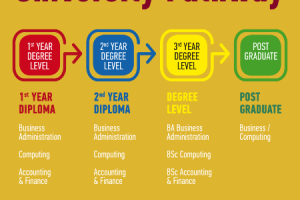A diploma can help you to quickly enter the job market.


Why a Diploma Could be a Better Way to Start a Career
A bachelor’s degree was once the gold standard in the job market. Employers favoured degree graduates for their proven knowledge and ability to learn.
However, industries are changing today. It’s no longer necessary to complete a full degree to be competitive in some jobs. Vocational Education and Training (VET) has created a new career pathway for students.
A VET diploma can provide you with highly specialized skills. Programs are designed to meet the needs of modern industries. Training is highly focused and condensed. This results in a faster program with no knowledge gaps.
Degrees still matter, but the balance is changing. Here’s why a diploma could be the better option to start your career.
You Can Quickly Enter the Job Market
Vocational training through a diploma is one of the quickest ways to get skilled for the job market. A full degree takes a minimum of three years to complete. Some take up to four years of full-time study.
This can be a lot to commit to after high school. You may already have a clear idea of where you want to go in your career. Waiting for three or four years might not be an option. A diploma is a suitable alternative because even with the most intensive program, you will graduate after two years of full-time study.
Earning Potential Can be Higher with a Diploma
Diploma graduates often earn more than degree graduates in their first jobs. Employers see more value in applicants who have completed industry-focused programs.
It’s not just earning potential that is higher. Completing a diploma could allow you to find a job faster. 78% of graduates find a job related to their diploma soon after completing training. Only 69% of degree graduates find employment in the first year after graduation. This is close to a 30-year low.
Keep in mind that the advantage can shift as you progress in your career. Higher positions in your chosen industry may require a bachelor’s degree. Earning a full degree after your diploma will ensure you can maximize your potential at every stage of your career.
Your Diploma Can Top Up to a Full Degree
Higher earnings and likelihood of employment can help you to make the right decision. Training for the fastest growing industries will ensure that you are competitive in the job market. However, your education doesn’t have to end with your diploma.
A diploma is the quickest way to get skilled for the workforce, but you can choose to take your education further as you progress in your career. Top up programs are available so that you can apply credits from your diploma to a full degree.
This can help you to expand your career horizons, while leveraging an existing qualification. Earning a diploma, gaining relevant industry experience, and then topping up to a degree could make you extremely competitive in the job market.
This can significantly reduce your study cost and commitment today, allowing you to better plan your career on your own terms.
Affordability Matters
Finally, we come to the point of affordability. For many students, this is one of the primary reasons to choose a diploma over a bachelor’s degree after completing high school.
Cyprus universities are some of the most expensive in the world. The cost of a single year of bachelor’s degree study can range from €8,000 to €13,000 per year. The average is around €10,000.
Compare this to a VET diploma where costs range from €1,500 to €3,000 per year, and it’s clear which option is more affordable.
If you are concerned about student debt and your future finances, choosing a diploma with the option to complete a degree in the future could be the best decision.
Plan Your Education Today
You can discard the outdated myths. Both degrees and diplomas have value. The right option for you depends on your intended career.
Starting with a diploma can get you skilled for high paying industries. Job opportunities and salaries are likely to be more competitive. You will still have the option to top up to a degree later, so you lose nothing in the process. Best of all, you’ll develop practical skills faster, preparing you to meet the demands of employers.
If you would like to experience our courses you can use our taster module following this link


